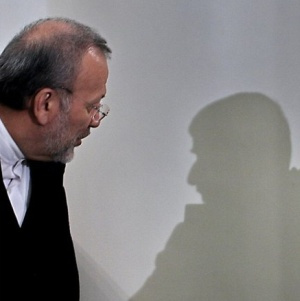Mottaki, Majles, Ministry

These days in Tehran the abrupt dismissal of Iranian FM Manouchehr Mottaki and his replacement by Dr. Ali Akbar Salehi, the incumbent president of Iran’s Organization of Atomic Energy, stands in the center of the political field. Speculation about the next minister of foreign affairs has been going on since last week; however, it is clear that the quality of the dismissal will affect Majles’ vote of confidence for the ministry hopeful. The Iranian parliament will apparently not give a warm reception to the ministry candidate, as it resents the government’s behavior. There are many vague points about Mottaki’s undiplomatic dismissal that need explanation by Mr. Ahmadinejad in person.
Despite all my criticisms of Mottaki’s record, I believe that if the president seriously cared about Mottaki’s profile, he could have at least waited for his return from his diplomatic mission to Senegal to fire him. I can’t still digest Ahmadinejad’s abrupt decision. Even if Mottaki’s diplomatic career was under question, why was he introduced by Ahmadinejad for a second term? The quality of Mottaki’s dismissal [while he was conveying the Ahmadinejad’s message to the President of Senegal] shows that it is all personal, and that calls for Ahmadinejad’s accountability. Ahmadinejad can, of course, claim that he is entitled to dismiss any minister he disfavors. True. But it is the right of Majles - as the institution that casts its vote of confidence for ministerial nominees- to question this decision. Ministers are not supposed to perform personal errands of the president. They should comply with the law. This is especially important at a position such as the foreign ministry, where national interests absolutely override personal and political interests.
Is Salehi the right choice for foreign ministry? As far as I know, the positions he has held so far were linked to his field of study, that is, nuclear physics. He has served as Iran’s representative to IAEA, but he is not the repository of foreign policy. In a world where diplomacy has turned into a science that is not a virtue, Ahmadinejad has not been particularly meticulous when it comes to diplomacy.
Salehi, or any other candidate, may of course receive an easy vote considering the country’s special circumstances: the critical Purposeful Subsidies’ plan is in operation, and Iran is facing increasing pressure by Western countries. These are not convincing arguments in my opinion but rather they should impel the lawmakers to put further thought into voting for the foreign ministry candidate. Unfortunately, at the moment our foreign ministry lacks sufficient experts and we are witnessing the appointment of freshmen as ambassadors to other countries. These inexperienced diplomats usually fail to safeguard Iran’s national interests, so at this point the need for a seasoned diplomat at the head of the foreign ministry is felt more than ever.

